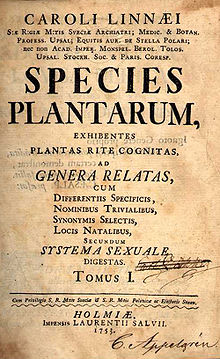Sp. Pl.

Cover page of first edition
|
|
| Author | Carl Linnaeus |
|---|---|
| Country | Sweden |
| Language | Latin |
| Subject | Botany |
| Published | Laurentius Salvius (1 May 1753) |
| Media type | |
| Pages | xi, 1200 + xxxi |
| OCLC | 186272535 |
Species Plantarum (Latin for "The Species of Plants") is a book by Carl Linnaeus, originally published in 1753, which lists every species of plant known at the time, classified into genera. It is the first work to consistently apply binomial names and was the starting point for the naming of plants.
Species Plantarum was published on 1 May 1753 by Laurentius Salvius in Stockholm, in two volumes. A second edition was published in 1762–1763, and a third edition in 1764, although this "scarcely differed" from the second. Further editions were published after Linnaeus' death in 1778, under the direction of Karl Ludwig Willdenow, the director of the Berlin Botanical Garden; the fifth edition (1800) was published in four volumes.
Species Plantarum was the first botanical work to consistently apply the binomial nomenclature system of naming to any large group of organisms (Linnaeus' tenth edition of Systema Naturae would apply the same technique to animals for the first time in 1758). Prior to this work, a plant species would be known by a long polynomial, such as Plantago foliis ovato-lanceolatis pubescentibus, spica cylindrica, scapo tereti (meaning "plantain with pubescent ovate-lanceolate leaves, a cylindrical spike and a terete scape") or Nepeta floribus interrupte spicatis pedunculatis (meaning "Nepeta with flowers in a stalked, interrupted spike"). In Species Plantarum, these cumbersome names were replaced with two-part names, consisting of a single-word genus name, and a single-word specific epithet or "trivial name"; the two examples above became Plantago media and Nepeta cataria, respectively. The use of binomial names had originally been developed as a kind of shorthand in a student project about the plants eaten by cattle.
...
Wikipedia
